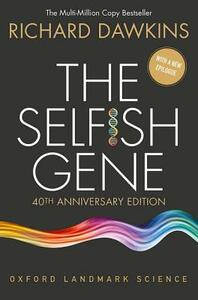Take a photo of a barcode or cover
This is one of those books that is important for scientifically-literate people to have read, but it is not necessarily the most current thought on the subject. In the book Dawkins coined the term "meme," which has developed a pop culture life of its own. Strangely enough, to my thought the meme section is the weakest part of the book. Dawkins excels in discussing evolution as a contest for survival of genes, and in placing kin selection as an important determinant of certain behavior, like altruism. I did not realize that Dawkins was an ethologist (behavior scientist) prior to reading this book, so I anticipated a different type of book than I read. He does an excellent job of conveying the effect and importance of mathematical models in non-mathematical language. The book is worth reading in the context of the history of biology and evolutionary thought, but the arguments are now stepping stones to more nuanced understandings of evolution, as well as the ongoing controversies between group and kin selection.
Richard Dawkins is always a little difficult to read, even for evolution buffs. But the huge amount of information you must absorb to read this book and understand the concepts presented is definitely worth the effort and time. An explanation of how altruism can exist if we use the gene, not the organism, as the focus of evolution.
Prior to reading Dawkins, I had no real experience with evolutionary theories aside from the little bits I'd been exposed to in various psychology courses. Not only have I learned an immense amount from this book, but the author has successfully sparked an interest in further speculations of this nature. Dawkins writes in a thorough and expressive manner, confident in his theories and unafraid to put less sensible (but all too popular) theories in their places. He introduces "memes" as replicating ideas on the same level of biological genes, a notion that fascinated me deeply. This author is a true scientific mind, and I look forward to reading more of his work.
This book is a comprehensive look at Dawkins' theory that species don't evolve, genes evolve. The science is easy to understand, but becomes a bit redundant. Dawkins uses at least one metaphor for every aspect that he's talking about, which just results in more confusion and explaining than necessary. The beginning of the book lays the groundwork for his theory, which becomes redundant by the middle of the book. However, the middle was worth powering through in my opinion to get to the last three chapters. In the last three chapters, Dawkins tackles how evolution and human culture is related. He has very interesting ideas on "replicators" in today's society and his views on how this is reflected in religion is very interesting. Overall, a good overview of one of the aspects of evolution, written in simple terms for all to understand.
Dawkins at his best. Necessary for anyone interested in genetics and evolutionary biology, if only as an armchair science enthusiast.
I have never read anything by Richard Dawkins before. I’ve heard his talks a few times. This is one of his first books, before he became all Super Anti-Theist that he is today (although there are a few remarks in the book that are critical of religion). This book isn’t a proof or defense of the theory of evolution. It assumes the reader already knows the basics about evolution and talks about how genes which are inherently “selfish” (that is they want all the resources and opportunity to grow and spread) end up combining into the vehicle that is an animal and cause said vehicle to operate in “altruistic” ways.
There were so many amazing stories of how different animals behave in the wild (Dawkins is a zoologist). I maybe understood half of the book. It was pretty technical. But it was challenging and I learned a lot and it got me thinking in a totally different way.
There were so many amazing stories of how different animals behave in the wild (Dawkins is a zoologist). I maybe understood half of the book. It was pretty technical. But it was challenging and I learned a lot and it got me thinking in a totally different way.
The Selfish Gene is one of the classics of science writing. All humans should be required to read this book.
challenging
informative
reflective
slow-paced




